Social Protection
Context
The State of the World’s Cash 2020 report found:
- Working with, through and alongside social protection systems is now considered key to strengthening the humanitarian-development nexus and humanitarians are increasingly active in this space
- Practitioners find that the three biggest challenges to effective linkages are: (i) lack of coordination between the actors involved, (ii) social protection systems are not designed to respond to crises, (iii) humanitarian practitioners lack expertise in social protection
- Critically, there is no ‘one size fits all’ solution to linking CVA and social protection. Trade-offs between efficiency, effectiveness, accountability, and sustainability must be considered to ensure the best outcomes for people living in crisis and depends on context, existing systems, and timeframe. Linking will not always be appropriate and social protection systems may not meet all needs. In many contexts, in the short to medium term at least, humanitarian programming will be required to fill gaps.
Current Priorities
The CALP Network has invested intensely in this thematic area over the last few years. We will continue to work closely with the SPIAC-B Working group on linking humanitarian (cash) assistance and social protection (formerly the Grand Bargain Sub-Workstream on Social Protection) and with the SocialProtection.org platform and the Online Community Social Protection in Crisis Contexts to develop evidence, produce capacity building materials and provide technical support to coordination actors.
Community of Practice
SocialProtection.org hosts a dynamic and collaborative online community of practice (CoP) bringing together individuals from diverse backgrounds interested in expanding social protection in crisis-prone areas. The CoP offers a space to exchange documents, insights, and news in order to progress and learn together. Its inclusive and member-led approach offers organisations and individual members a forum to increase learning and outreach, facilitating the exchange of experiences and expanding knowledge. A discussion group hosted by dgroups.org complements these activities by connecting users rapidly via email.
SPACE
There are a wealth of relevant resources from ‘Social Protection Approaches To Covid-19: Expert Advice’ (SPACE) published in the CALP library.
Featured content

Linking Social Protection and Humanitarian Cash and Voucher Assistance
Report
There is a growing momentum and body of work around the idea of developing stronger links between humanitarian cash and voucher assistance (CVA) and social protection (SP). This Briefing Paper for the CALP Network, based on a literature review, a survey, and interviews, is intended to inform the CALP Network’s overall approach in this area, and subsequently its capacity building and...

Linking Social Protection and Humanitarian Cash
Blog Post
The case for social protection to help people cope with shocks has always been clear and never more obvious than during the current Covid-19 crisis. These issues are currently playing out in real time as governments, donors and aid agencies scramble to find ways to get more help to more people to cope with the economic consequences of illness and lockdown. As the virus starts to take hold in...

Linking Social Protection and humanitarian cash and voucher assistance (CVA) – what do we really know and where to start? Findings from the CALP Network commissioned high level briefing paper at the time of COVID-19
Webinar
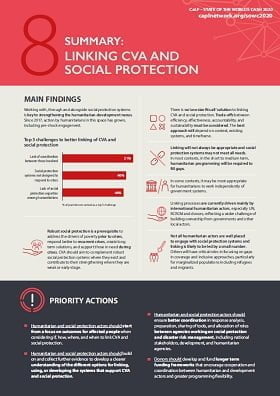
State of the World’s Cash 2020 Chapter 8 summary: Linking CVA and social protection
Report
Longstanding efforts to strengthen links between humanitarian CVA and social protection have been accelerated by the COVID-19 pandemic, with significant progress since the last report. CVA should aim to complement robust social protection systems where they exist and contribute to their strengthening where they are weak or early-stage. This chapter asks: ‘What opportunities and challenges...
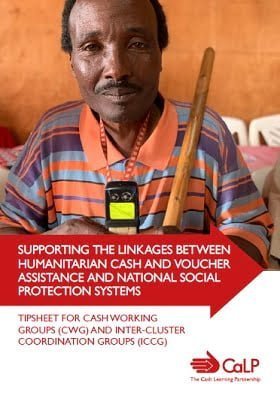
Supporting the Linkages Between Humanitarian Cash and Voucher Assistance and National Social Protection Systems
Report
This tipsheet aims to support country-level coordination efforts to strengthen the engagement between humanitarian coordination groups that implement cash and voucher assistance (CVA) and existing social
protection or disaster risk reduction coordination actors and groups. In particular, it seeks to offers inter-cluster and cash working group coordinators simple practical tips for engaging...
Case Studies

Linking CVA and Social Protection in the MENA Region – Crib sheet
Report
Building linkages between humanitarian cash and voucher assistance (CVA) and social protection (SP) has become an increasingly prominent topic over the past five years and the Middle East and North Africa (MENA) region has been at the centre of this evolution. The objective of this resource set (the crib sheet and 3, soon to be 6, regional case studies) is to ensure that the CALP Network...
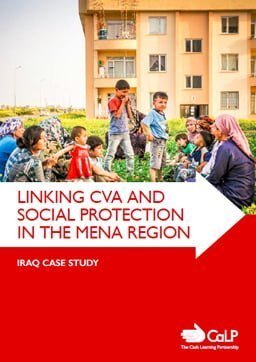
Linking CVA and Social Protection in the MENA Region – Iraq Case Study
Report
Building linkages between humanitarian cash and voucher assistance (CVA) and social protection (SP) has become an increasingly prominent topic over the past five years and the Middle East and North Africa (MENA) region has been at the centre of this evolution. The objective of this resource set (the crib sheet and 3, soon to be 6, regional case studies) is to ensure that the CALP Network...

Linking CVA and Social Protection in the MENA Region – Lebanon Case Study
Report
Building linkages between humanitarian cash and voucher assistance (CVA) and social protection (SP) has become an increasingly prominent topic over the past five years and the Middle East and North Africa (MENA) region has been at the centre of this evolution. The objective of this resource set (the crib sheet and 3, soon to be 6, regional case studies) is to ensure that the CALP Network...
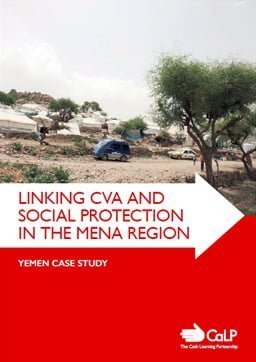
Linking CVA and Social Protection in the MENA Region – Yemen Case Study
Case Study
Building linkages between humanitarian cash and voucher assistance (CVA) and social protection (SP) has become an increasingly prominent topic over the past five years and the Middle East and North Africa (MENA) region has been at the centre of this evolution. The objective of this resource set (the crib sheet and 3, soon to be 6, regional case studies) is to ensure that the CALP Network...

Linking Cash and Voucher Assistance (CVA) and Social Protection – Occupied Palestinian Territories (OPT): Country Summary
Report
This country summary is part of a larger resource set, providing practitioners with examples of different approaches to linking CVA
and social protection.
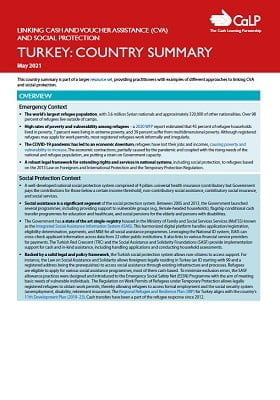
Linking Cash and Voucher Assistance (CVA) and Social Protection – Turkey: Country Summary
Report
This country summary is part of a larger resource set, providing practitioners with examples of different approaches to linking CVA
and social protection.
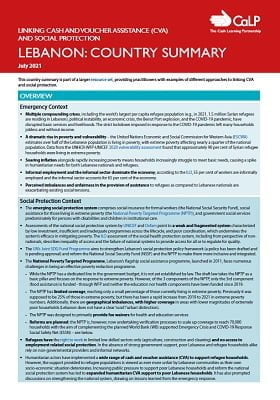
Linking Cash and Voucher Assistance (CVA) and Social Protection – Lebanon: Country Summary
Report
This country summary is part of a larger resource set, providing practitioners with examples of different approaches to linking CVA
and social protection.
Thematic lead
Latest

Cash-Based Safety Nets for Livelihood Support in Northeastern Somalia: A Feasibility Study for Save the Children UK and Horn Relief
Case Study
This study looks at the need for and feasibility of cash-based safety net programming within the operational areas of Save the Children UK and Horn Relief in Northeastern Somalia. The success of recent emergency cash transfer programs in Somalia permit the question of whether cash-based programs are...
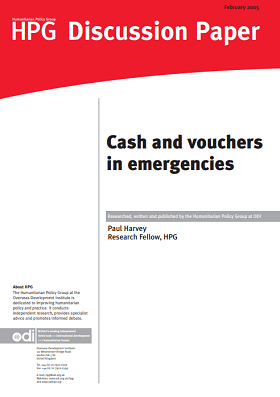
Cash and Vouchers in Emergencies
Report
This HPG discussion paper examines all aspects of using cash and vouchers to assist people in emergency situations. It provides a background to the literature and theory around cash and vouchers, looks at the current picture through selected examples and examines the decision making process on the...
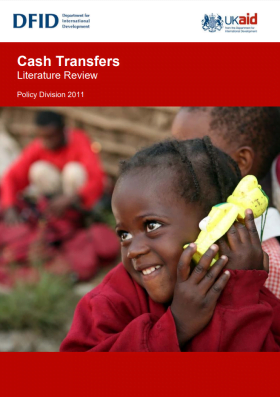
DFID Cash Transfers Literature Review
Report
This paper provides a synthesis of current global evidence on the impact of cash transfers in developing countries, and of what works in different contexts, or for different development objectives. Cash transfers are direct, regular and predictable non-contributory cash payments that help poor and...
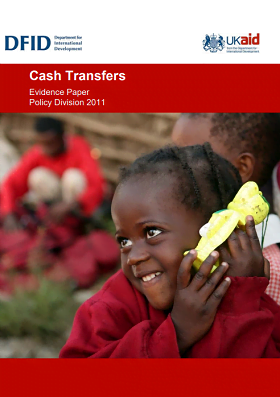
Cash transfers: Evidence paper
Report
This DFID evidence paper provides a synthesis of current global evidence on the impact of cash transfers in developing countries in achieving a range of social and economic policy objectives. It examines design and implementation choices for tailoring programmes to particular objectives, notably social...

Cash transfer programming in emergencies: The Cash Learning Partnership’s 5th Global Learning Event
Report
The CALP Network’s 5th Global Learning Event was organised in partnership with the International Federation of Red Cross and Red Crescent Societies (IFRC). The learning event took place in Nairobi, Kenya, and focused on three topics of emerging importance not only to cash transfer programming, but to...

Richer but Resented: What do cash transfers do to social relations and does it matter?
Report
This paper looks at how social protection cash transfers are evaluated primarily in terms of poverty reduction or human capital, with their impact on social relations being under-examined. The authors examine case studies from Kenya, Malawi and Zimbabwe, and argue that the impact of cash transfers on...
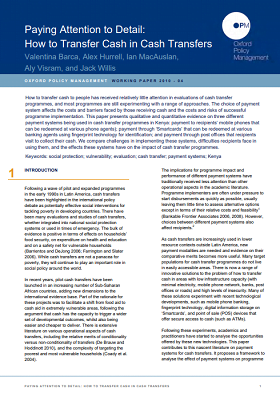
Paying attention to detail: How to transfer cash in cash transfers
Report
This policy working paper looks at various delivery mechanisms which can be used to transfer cash to people in cash interventions. It discusses how these affect the costs, and the barriers, faced by those receiving cash as well as the costs and risks to implementing agencies of successful programme...
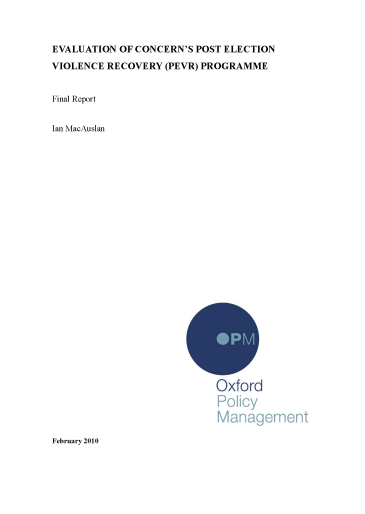
Evaluation of Concern’s Post Election Violence Recovery (PEVR) programme
Case Study
Concern’s Post Election Violence Recovery (PEVR) Programme was a cash transfer programme operating in areas of Kenya (Nairobi, Nyanza, and the Rift Valley) affected particularly badly by the violence that followed the announcement of the national election results in late 2007. Building on several other...

Guidelines for cash interventions in Somalia
Guidelines and Tools
These guidelines are intended for all agencies operating in Somalia to represent a common approach to cash transfer programming for food security and livelihood activities in Somalia. The guidelines outline the minimum acceptable standards for cash interventions and provide the justification for...
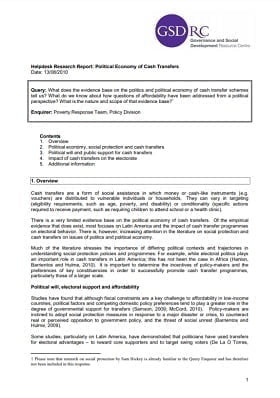
Helpdesk Research Report: Political Economy of Cash Transfers
Report
Cash transfers are a form of social assistance in which money or cash-like instruments (e.g. vouchers) are distributed to vulnerable individuals or households. They can vary in targeting (eligibility requirements, such as age, poverty, and disability) or conditionality (specific actions required to...

Cash Transfers in Post-conflict Contexts
Report
This ODI project briefing looks at the implementation for the design of cash programmes in post-conflict or fragile states, compared to those of peaceful and stable countries. It highlights examples from Sierra Leone and Nepal drawing lessons from existing programmes, examines the contribution to poverty...
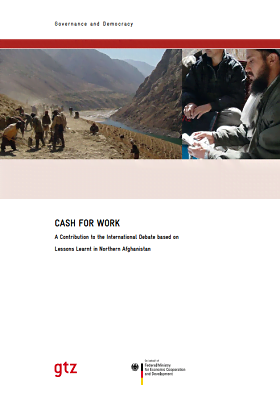
Cash For Work: A Contribution to the International Debate based on Lessons Learnt in Northern Afghanistan
Case Study
The purpose of this study was to document learning from BMZ finance cash for work (CFW) projects implemented by GTZ in Afghanistan as a contribution to international debates about cash transfer approaches. The operations of the GTZ CFW scheme in Northern Afghanistan are financed by the German Federal...

Fresh food vouchers for refugees in Kenya
Report
Read the report here This article in Field Exchange magazine outlines an intervention by ACF in Dadaab to improve the nutritional intake and dietary diversity of the refugee population of Dadaab, Kenya, through a complementary food voucher scheme targeted at malnourished children.

Niger: Food Security and Safety Nets
Case Study
From the perspective of social protection, this study is designed to synthesize considerable existing analysis, review food and nutrition security policies and programs in Niger, and provide an action plan for strengthening the existing system and developing an effective food security and safety net...
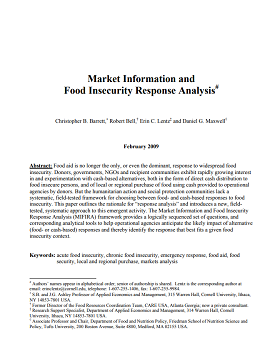
Market Information and Food Insecurity Response Analysis
Report
This paper outlines the importance and rationale for agencies to undertake a “response analysis” before choosing an appropriate programme delivery mechanism to a humanitarian situation. The Market Information and Food Insecurity Response Analysis (MIFIRA) framework is introduced. This provides a...

From Food Crisis to Fair Trade: Livelihoods analysis, protection and support in emergencies
Report
This document aims to collate and analyse experiences of livelihoods programming in emergencies. It provides an overview of what livelihoods programming is and gives examples of the range of interventions that are possible in emergencies. Different types of livelihoods programmes are then described...

Cash transfers: Lump Sums
Report
This briefing is one of a series of six produced as an output from a three year ODI research study on cash transfers and their role in social protection. The study explores issues of interest to donors and governments, comparing cash with other forms of transfer, identifying where cash transfers are...

Money Matters: An evaluation of the use of cash grants in UNHCR’s voluntary repatriation and reintegration programme in Burundi
Report
To access another publication available in this series, titled ‘The Use of Cash Grants in UNHCR Voluntary Repatriation Operations: Report of a Lessons Learned Workshop’, please click here. There has been growing interest in recent years in the use of cash grants as a humanitarian assistance and...

Cash transfers in emergencies: A synthesis of World Vision’s experience and learning
Report
This HPG study report, commissioned by World Vision, looks at the shifting view towards cash programming by the humanitarian community, and focuses on the specific challenges and needs which World Vision would have to address when considering the use of cash in emergencies. A general background of cash...
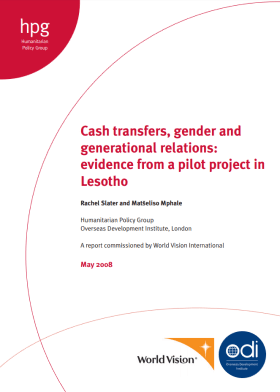
Cash Transfers, Gender and Generational Relations: Evidence from a Pilot Project in Lesotho
Report
Food aid has been the main response to repeated and protracted humanitarian crises in Lesotho since 2002, and during that time it has also been the major part of World Vision’s emergency responses. Along with the government, donors and NGOs, World Vision is increasingly interested in the role that cash...




